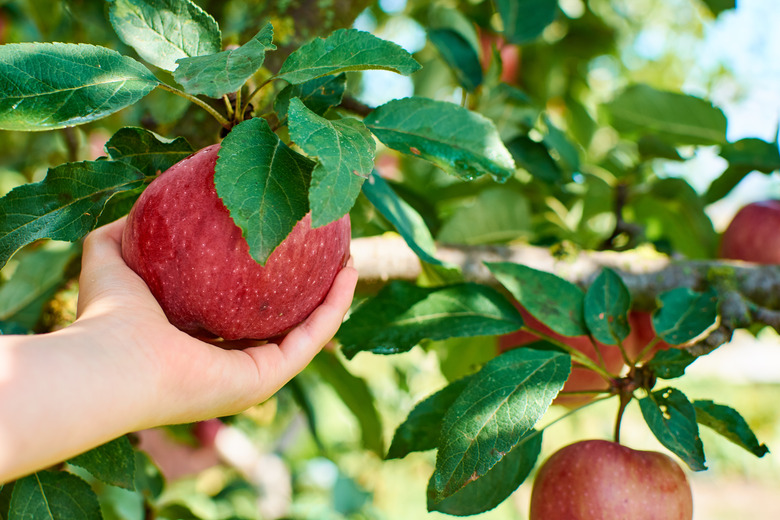What Fruit Trees Can Grow In Pennsylvania?
Home gardeners in Pennsylvania are able to grow a relatively wide range of tree fruits depending on where they live in the state. Overall, the climate is moderate. Gardeners won't face Alaska's cold and short growing season or Arizona's heat and aridity, and dangerous extremes of temperature are pretty rare. The best fruit to grow in Pennsylvania, then, are trees that flourish in this kind of moderate climate.
Tip
Growing conditions in Pennsylvania are appropriate for a wide variety of fruit trees, primarily pomes (the apple family) and stone fruit.
Planning for Pennsylvania Fruit Trees
Planning for Pennsylvania Fruit Trees
If your property is small, you may have little option but to plop your tree of choice wherever there's room and hope for the best. If you have some flexibility, though, even a modest amount of research before you plant can substantially improve your chances of success.
First, consider the climate. Stone fruits in general do best in the southern half of the state (south-central and southeast) and should be avoided if you live where winter temperatures can drop below -20 degrees Fahrenheit. Pome trees in general are hardier and can be grown across the state as long as you choose a variety that's hardy enough.
If there is any slope to your land, you'll need to take that into consideration as well. South-facing slopes provide favorable microclimates, while north-facing slopes are colder, and west-facing slopes are exposed to the prevailing winds across most of the state. Planting partway up any slope is helpful because cold air will settle in the lowest parts of your property.
Finally, you'll need to select varieties that are resistant to any diseases or insect pests that are common in your immediate location. Don't reinvent the wheel; talk to gardeners in your immediate area and learn from their experience. Your local extension office and local nurseries are other good resources, and Pennsylvania also has a Backyard Fruit Growers association you can join or turn to for advice.
Tip
If you aren't worried about picture-perfect fruit and don't plan to invest time and money in spraying, look to organic and no-spray orchardists for advice on which cultivars are best suited to that approach.
Growing Pome Trees in Pennsylvania
Growing Pome Trees in Pennsylvania
Apples (Malus domestica) and their kin (collectively called pome fruit) are among the best fruit to grow in Pennsylvania, partly because they're a moderate-climate tree by nature and partly because there are simply so many cultivars from which to choose. For example, some apples are superior for cooking or baking or eating out of hand, while others are best known for long storage or their ability to produce reliably in difficult settings. Choose one that is resistant to local pests and that matches your intended use.
If you prefer pears, crunchy Asian pears (Pyrus pyrifolia) grow surprisingly well in Pennsylvania, and Korean Giant is a sturdy cultivar with fruit that can store for months in your fridge. European pears (Pyrus communis) are chancier, with familiar varieties like Bartlett, Bosc, and Anjou facing significant difficulties with disease. Resistant new hybrids, including Shenandoah, Blake's Pride, and Harrow Delight or Harrow Sweet may be better options.
Quinces are an old-time favorite and are much harder to find now than apples or pears. Their fruit is rock hard and too tart to eat fresh but is excellent for baking and preserves. (They're very high in pectin and were grown for jam-making back in the day.) In general, they'll grow where apples grow.
Growing Stone Fruit in Pennsylvania
Growing Stone Fruit in Pennsylvania
Among stone fruit, sour cherries, or "pie cherries," are the most reliable to grow. Sweet cherries, the kind you eat fresh, can be grown but are more susceptible to pests and disease. Plums, peaches, apricots, and nectarines can all potentially be grown in the southern portions of Pennsylvania, but you should consider them something of a passion project. They're a high-maintenance option requiring lots of spraying, careful selection of the best microclimate you have, and constant vigilance against pests and extremes of temperature.
Even at that, a late-spring frost can easily write off your whole year's production by killing the blossoms. You'll enjoy them all the more, of course, on those years when you do get a crop. Choose cultivars that have shown resilience in your immediate area, give them as much help as you can, and hope for the best.
Other Tree Fruit
Other Tree Fruit
Lesser-known tree fruit, including some native Pennsylvania fruit trees and others indigenous to the Eastern states, are some of the easiest and most reliable to grow. The chokecherry (Prunus virginiana) and Carnelian cherry (Cornus mas) both produce small, tart fruit that are excellent for preserves. The shadberry or serviceberry (Amelanchier spp.) produces large quantities of tasty, blueberrylike fruit for eating, baking, or preserves. Mulberries (Morus alba) are a larger tree (and berry), and they can be enjoyed fresh. There are several cultivars available, but a self-fertile variety such as Morus rubra 'Illinois Everbearing' means you can get by with just one tree, which will usually produce all you can use.
Among larger fruit, pawpaws (Asimina triloba) grow reliably across much of Pennsylvania and produce a tasty, deceptively tropical-tasting fruit. American persimmons (Diospyros virginiana) are also reliable and are excellent for baking or eating fresh once they're fully ripe.
Surprisingly, there's even a citrus fruit that can flourish in much of Pennsylvania. It's the hardy orange, or trifoliate orange (Poncirus trifoliata). It grows on a small tree/large shrub that's dense and packed with thorns, and it makes a good hedge or barrier planting. It's only hardy down to -10 degrees, so it can't be grown across the entire state, but it's reliable within that limitation. Its blossoms are sweet, but its fruit is tart, and it's best suited to baking or preserves.
